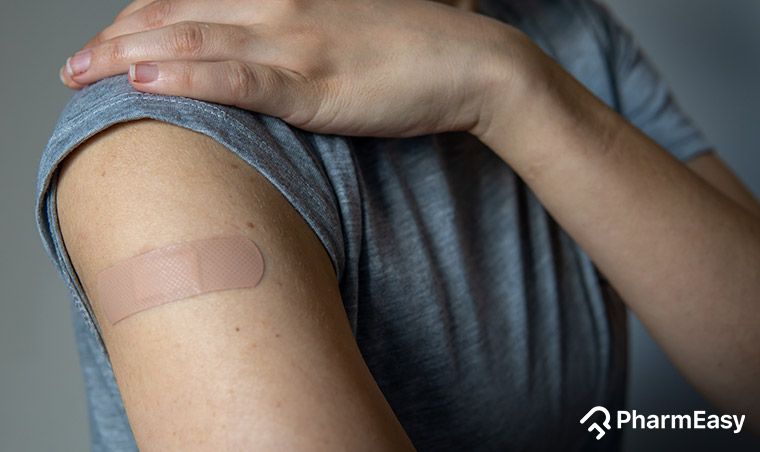Why Do People Experience Pain In The Arm After The COVID Shot?
By Dr. Nikita Toshi +2 more

Get,

to manage your symptom
Get your,


4 Cr+ families
benefitted

OTP sent to 9988776655



You’ve successfully subscribed to receive
doctor-approved tips on
Whatsapp

Get ready to feel your best.

Hi There,



Register to Avail the Offer
Send OTPBy continuing, you agree with our Privacy Policy and Terms and Conditions

Hi There,

Trusted by 4 crore+ families

OTP sent to 9988776655



You have unlocked 25% off on medicines




Code: NU25

By Dr. Nikita Toshi +2 more
Table of Contents
The second wave of COVID-19 has devastated the whole world. The death toll is unparalleled and the economic losses are incalculable. The constant threat of contracting COVID-19 and the way it upends life is something that we are forced to live with.

The second wave may be slightly on the decline. We have no inkling about when it will recede entirely. Besides, it is now evident that a third wave is on its way. There is no consensus yet on when it will manifest itself but according to most estimates, it will arrive anytime between September and December.
At such a juncture, vaccination is the only ray of hope. COVID-19 vaccination was kicked off in February and by now people above 18 years of age are legible for the jab.
India has slowly been ramping up vaccination and on June 21st reached an all-time high. All of this comes as heartening news during these dark and uncertain days. Vaccine availability is increasing because by now, municipal offices, healthcare bodies, hospitals and large organizations are planning and executing vaccination drives.
Post vaccination pain is common to all intramuscular vaccines and is not limited to covid vaccine. It is a self limiting pain and very mild.
Dr. M.G. Kartheeka, MBBS, MD
Despite all efforts being made to speed up vaccination, there are still some people who are loath to take the vaccine. Rumours about the apparent dangers of the vaccine and the severe COVID vaccine side effects abound. Some people are downright terrified of the after-effects that are associated with the vaccines such as fever, body ache, pain at the site of the injection or even slight nausea.
The cobwebs of misinformation can easily be swept away with scientific understanding.
If you experience severe pain at the injection site which lasts beyond 48 hours and is associated with redness, tenderness, burning sensation and a visible lump, it is recommended to visit a physician to get treated.
Dr. Ashish Bajaj, M.B.B.S., M.D.
Most of the after-effects of the COVID-19 vaccine are indications that the vaccine is working! Most people who’ve received one or both the COVID doses have complained of a sore arm. The pain can range from slight discomfort to a level that makes it difficult to operate that arm. These symptoms usually resolve in a few days.
Here are some of the most common COVID vaccine side effects related to the arm:
The COVID-19 vaccine is an intramuscular vaccine. It is usually injected into your deltoid muscle (responsible for giving your upper arm and shoulder their range of movements).
The vaccine that is injected into your body mimics the coronavirus and tricks your immune system into believing that the body is under attack without actually causing an infection. This elicits an immune response that may appear as the COVID vaccine side effects.
When your body senses the vaccine, it triggers a response in the form of inflammation at the site of the jab. Inflammation can cause some redness, swelling and pain and it also means your immunity is active now. This response varies from person to person hence, the post jab symptoms are of different intensity and types in different people.
Another reason why the arm is sore after COVID vaccination and the region swells up is that it has sustained a very tiny needle injury.
COVID vaccine arm pain may last for 5 – 10 days for some, even when the other COVID vaccine side-effects die down. Also, some people have experienced a very mild pain that lasted for a couple of days. The positive note to be kept in mind is that this discomfort is temporary and will go away in a few days but the protection against a serious COVID infection will last for long.
If your sore arm after COVID-19 vaccination is not giving you a moment’s peace, then there are a few ways you can relieve the pain:
The COVID-19 vaccines are our only hope against the pandemic. The COVID vaccine arm pain and the other COVID vaccine side-effects are very short term effects and weigh nowhere near the protection granted by the vaccines. They can save your life! If you haven’t booked a slot yet, do it now.
Disclaimer: The information provided here is for educational/awareness purposes only and is not intended to be a substitute for medical treatment by a healthcare professional and should not be relied upon to diagnose or treat any medical condition. The reader should consult a registered medical practitioner to determine the appropriateness of the information and before consuming any medication. PharmEasy does not provide any guarantee or warranty (express or implied) regarding the accuracy, adequacy, completeness, legality, reliability or usefulness of the information; and disclaims any liability arising thereof.
Links and product recommendations in the information provided here are advertisements of third-party products available on the website. PharmEasy does not make any representation on the accuracy or suitability of such products/services. Advertisements do not influence the editorial decisions or content. The information in this blog is subject to change without notice. The authors and administrators reserve the right to modify, add, or remove content without notification. It is your responsibility to review this disclaimer regularly for any changes.

Leave your comment...
Comments